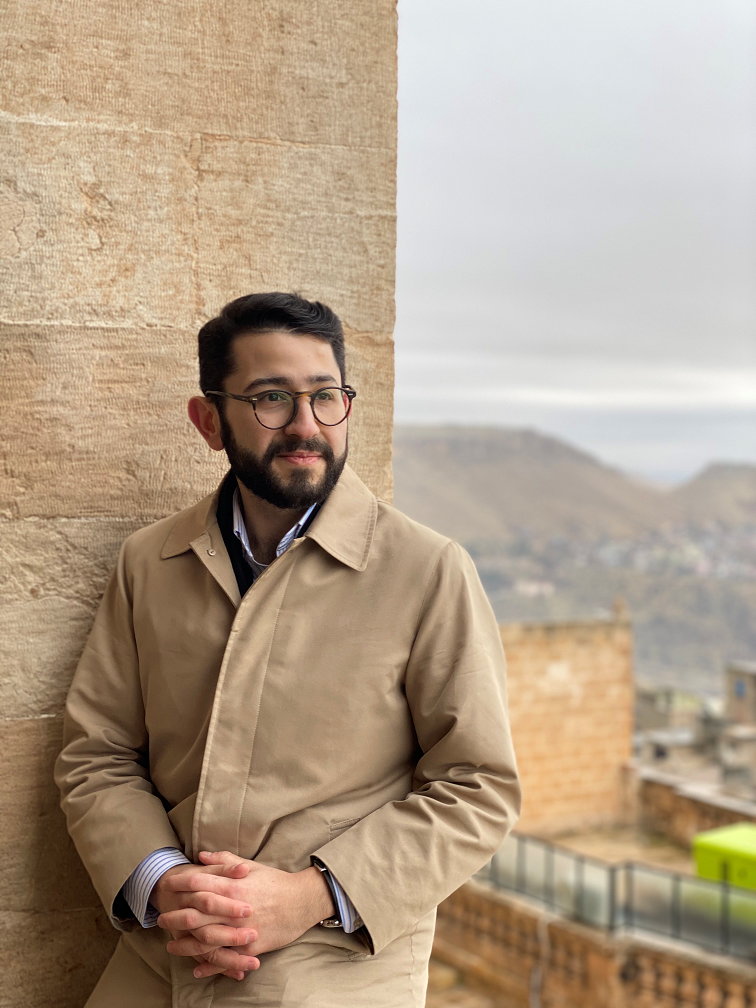An interview with Dr. Mustafa Aydogan, Dunn School Graduate Turned UCSF Sandler Faculty Fellow
Dr. Mustafa Aydogan is sure to make a strong impression.
Years ago, when I first knew Mustafa to be a graduate student in the year above me, I watched him present his research in one of our department’s Progress Seminars. Afterwards, I couldn’t help but think that Mustafa was actually already a professor, and it was just that the title hadn’t caught up with his bearing.
Now, that title is potentially coming closer. Mustafa completed his graduate studies in December 2019, and is preparing to start his own research group as a faculty member at the University of California, San Francisco in late March/April 2020. As a UCSF Sandler Faculty Fellow, Mustafa will have the resources and support from the UCSF to operate a lab of up to four members for five years, in order to conduct his own independent research. His lab will be based at the Genentech Hall, and he will share the floor with distinguished scientists such as Bruce Alberts, Peter Walter, Patrick O’Farrell and Dave Morgan.
I had the opportunity to talk to Mustafa before moving to UCSF.
How would you summarize the research topic of your new lab?
In general terms, the topic is about decision making and subcellular clocks. There are many events within the cell that, to a degree, are binary in nature, such as mitochondrial division or fusion; ER sheet or tubule formation; DNA synthesis initiation or termination.
The majority of these events have very specific timing as well; mitochondrial fission at the onset of mitosis, for example. And the question is, how does the cell decide to do these things? If you ask most biologists today, the prevailing school of thought—or dogma, even—is that these events are triggered to occur via cues provided by the cell cycle.
My graduate studies have shown that at least one organelle, the centriole, has a timing mechanism that can act even in the absence of a robust cell cycle machinery to direct their growth and duplication. My hypothesis is that other processes in the cell could be doing something similar. In other words, there might be hidden rhythms, and we just need to listen to them. Each process could have their own specific timing mechanisms and could be able to proceed even in the absence of the cell cycle. However, the benefit of the cell cycle would be to help organize all these events specifically.
How would you test it?
My background is mostly in cell biology and biophysics, though now people have started calling me a systems biologist, which I have to admit I don’t really know what that means! But, from what I understand, a systems biologist uses a mixture of all sorts of methods, and is more question focused. So, to get started, we will be using a lot of microscopy. Super resolution fluorescent microscopy, electron microscopy, and also mathematical modeling to follow up on our findings from the cell.
As for a model system, we will still be using flies, as the fly embryo is a fantastic system, and I think a perfect system for the study of subcellular clocks. It’s a giant cell, and there’s loads of sample, organelles, whatever you’re interested in. And since it’s a single multi-nucleated cell, thousands of events can be observed in a single sample, and everything happens synchronously, which can be quite advantageous.
And for a little bit of something new, we will also be trying out some in vitro reconstitution using Xenopus egg extracts and purified proteins, as many of these processes I described earlier can be studied in solution. Though, they lose their timing and start becoming more stochastic in nature.
Where did the hypothesis come from?
When I was preparing for the Department’s graduate student symposium, I was trying to come up with something to explain what my research meant to the rest of biology. People would snore if I said I found something specific about centrioles—they don’t want to just know that. But what if I say my findings may have bigger implications about how things work in the cell? That’s how I came up with this little hypothesis. And here I have to acknowledge the help of Dr. Mohammad (Mo) Mofatteh in the Raff Lab. I was actually so close to removing this hypothesis from my talk! I was just a PhD student; how dare I present such a hypothesis? But I talked endlessly with Mo about it, to develop the hypothesis, and it was he who told me I had nothing to lose, and I should go for it.
How did it feel to talk about this idea as just a PhD/DPhil student?
Of course, this hypothesis is different from the current paradigm of the cell cycle controlling everything. Actually, going to conferences and speaking with the more senior colleagues in the field, I expected a lot more resistance against the hypothesis. But, people have been much more welcoming to it than I ever imagined them to be.
What was it like to try and take your ideas to the next stage, as group leader yourself?
I first came here to the UK as an international PhD student, and I’m extremely grateful to the department, the EPA Trust, and my supervisor, Jordan Raff for giving me that opportunity, and all the support he’s given me along the way. Jordan has been so generous to allow me to work in a semi-autonomous manner. I’ve had a chance to pursue this oscillator topic, which had nothing to do with the rest of the lab. Jordan had the brave, courageous trust in me, to try something new, and it’s a new idea to take with me, and it’s provided new avenues for people in the lab.
During the application and interviewing process itself, some members of the Dunn School faculty really helped me as well. They coached me through the process of faculty interviews, conducting mock interviews to help me get ready and prepared for the real thing later. And I’m very grateful to those people.
What’s the timeline for the future look like?
At the moment I am wrapping up my work here at the Dunn School. There is still a lot to do! We have papers that we need to submit and some work in revision that may require further attention. But the nice thing about fly work is that while you are waiting for the flies to develop you can be busy with other things! So I have been able to conceptualize, and even do trial experiments about the new topics that I’d like to work with, so it’s been really fun.
Hopefully towards the end of March/April I’ll be able to start at UCSF. I have already started looking for some people to hire, to get some work going. I’m hoping to draw some rotation students from the UCSF Tetrad Program in the Fall, whom I’ve heard are extremely talented.
I must thank the UCSF Sandler Fellows program and the Sandler Foundation, who are providing me with 5 years of funding, and allowing me to work without worrying about applying for funding from other sources, though I do plan to do so!
Obviously, this is a big change. You’re starting a new lab in a new continent. Are you nervous?
As a 9th century Mu’tazila philosopher, Ibrahim Al-Nazzam, says: “Science won’t give you anything if you don’t devote yourself fully to it. And even if you devote yourself fully, it’s not certain science will give you anything.” And by anything, I mean a major breakthrough or serendipity of some kind. It’s just a matter of my philosophy, that if I devote myself and am conscious that I might get nothing out of it, then there’s no daily pressure in my mind. So, I’m not nervous at all!
Do you have advice for current graduate students?
As a PhD student, this is a time when you have nothing to lose, and that’s an advantage you can take. Do the most drastic, interesting research you can think of. Go out of your way to attend conferences, even if you think you don’t have anything to present! Don’t be afraid to chat with people – just because someone won the Lasker Prize doesn’t mean you can’t speak to them, even as a PhD student! Just relax and talk to them.
You have to have the right mindset. I don’t like the mindset of being “just a PhD student.” No! We are all scientists, and you don’t have to be at some position to be creative or do good science.
Follow the lab Twitter
Editorial note: This interview was edited for brevity and clarity.
Written by Derek Xu

